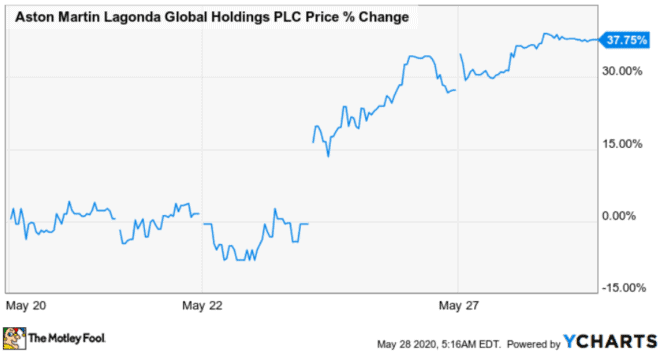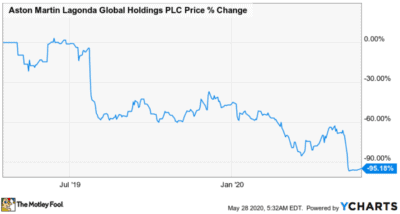Shares of Aston Martin Lagonda (LSE:AML) rallied in the past several days after the company’s announcement that its CEO Andy Palmer would step down. The news was quite in line with the overall stock market rebound. But is Aston Martin’s stock rally sustainable?
What does the news mean?
Tobias Moers, chief executive at Mercedes’ subsidiary AMG, is taking Andy Palmer’s place from 1 August. The markets reacted very positively when the news was announced. In the last few days the firm’s stock surged by more than a third. This was also partly due to the overall optimism that the world’s economy was opening up. But is this enthusiasm about new leadership justified?

The truth is that the 107-year-old company has gone bankrupt seven times. In 2014, the company was about to go bankrupt again when Andy Palmer became the new CEO. He managed to return the company to profitability and avoid the painful restructuring.
However, the stock’s total decline exceeded 90% since the date of Aston’s 2018 IPO.

Let’s look at the reasons for this.
Fundamentals
The most recent share price plunge was largely due to drastically falling car sales. As we all know, Covid-19 has kept many people stuck at home and therefore unable to buy new cars. So, every car manufacturer suffered as a result. But the truth is that Aston Martin’s problems started long before the pandemic.
In 2019 the car maker’s sales revenue fell by 9%. Although Aston Martin’s car sales benefitted from rising demand in the Americas, European and Chinese consumers purchased fewer vehicles. Meanwhile, the company ended 2019 with a loss of 32.1p per share as opposed to a profit of 27.5p per share in 2018. So, the company had to increase its indebtedness. As a result, its adjusted leverage ratio (liabilities/earnings before interest, taxes, depreciation, and amortisation) rose from 2.3 to 7.3.
This was a huge jump but the company had to increase its borrowing in order to survive and to finance some of its ambitious projects. These projects included investments in electric and sports utility cars. Many analysts believe that electric cars have a great future due to consumers’ rising environmental awareness. But starting this production from scrap requires heavy capital expenditure. As we can see, Aston Martin was unable to finance these investments without a major debt raise.
Shares for a stock market rebound?
The new management announced that Aston Martin would pursue its core strategy. This means that it would produce traditional sports cars. The investors clearly liked this decision because it would allow the company to decrease its cash outflows. However, the new management has many challenges to cope with. For example, the company won’t be able to borrow cheaply because of its junk credit rating.
I totally agree with my colleague Alan Oscroft that Aston Martin’s shares might have been unfairly depressed due to the coronavirus pandemic. However, I am not going to buy this company’s shares. I think they are too risky and there are many other safer alternatives.







